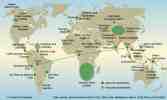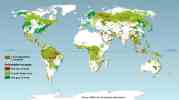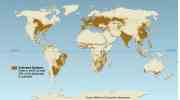30 March 05
Experts Warn Ecosystem Changes
Will Continue to Worsen, Putting Global Development Goals At Risk
 A
landmark study released today reveals that approximately 60 percent of the
ecosystem services that support life on Earth – such as fresh water,
capture fisheries, air and water regulation, and the regulation of
regional climate, natural hazards and pests – are being degraded or used
unsustainably. Scientists warn that the harmful consequences of this
degradation could grow significantly worse in the next 50 years. A
landmark study released today reveals that approximately 60 percent of the
ecosystem services that support life on Earth – such as fresh water,
capture fisheries, air and water regulation, and the regulation of
regional climate, natural hazards and pests – are being degraded or used
unsustainably. Scientists warn that the harmful consequences of this
degradation could grow significantly worse in the next 50 years.
“Any progress achieved in
addressing the goals of poverty and hunger eradication, improved health,
and environmental protection is unlikely to be sustained if most of the
ecosystem services on which humanity relies continue to be degraded,” said
the study, Millennium Ecosystem Assessment (MA) Synthesis Report,
conducted by 1,300 experts from 95 countries. It specifically states that
the ongoing degradation of ecosystem services is a road block to the
Millennium Development Goals agreed to by the world leaders at the United
Nations in 2000.
Although evidence remains
incomplete, there is enough for the experts to warn that the ongoing
degradation of 15 of the 24 ecosystem services examined is increasing the
likelihood of potentially abrupt changes that will seriously affect human
well-being. This includes the emergence of new diseases, sudden changes in
water quality, creation of “dead zones” along the coasts, the collapse of
fisheries, and shifts in regional climate.
The MA Synthesis Report
highlights four main findings:
-
Humans have changed ecosystems
more rapidly and extensively in the last 50 years than in any other
period. This was done largely to meet rapidly growing demands for food,
fresh water, timber, fiber and fuel. More land was converted to
agriculture since 1945 than in the 18th and 19th centuries combined.
More than half of all the synthetic nitrogen fertilizers, first made in
1913, ever used on the planet has been used since 1985. Experts say that
this resulted in a substantial and largely irreversible loss in
diversity of life on Earth, with some 10 to 30 percent of the mammal,
bird and amphibian species currently threatened with extinction.
-
Ecosystem changes that have
contributed substantial net gains in human well-being and economic
development have been achieved at growing costs in the form of
degradation of other services. Only four ecosystem services have been
enhanced in the last 50 years: increases in crop, livestock and
aquaculture production, and increased carbon sequestration for global
climate regulation. Two services – capture fisheries and fresh water –
are now well beyond levels that can sustain current, much less future,
demands. Experts say that these problems will substantially diminish the
benefits for future generations.
-
The degradation of ecosystem
services could grow significantly worse during the first half of this
century and is a barrier to achieving the UN Millennium Development
Goals. In all the four plausible futures explored by the scientists,
they project progress in eliminating hunger, but at far slower rates
than needed to halve number of people suffering from hunger by 2015.
Experts warn that changes in ecosystems such as deforestation influence
the abundance of human pathogens such as malaria and cholera, as well as
the risk of emergence of new diseases. Malaria, for example, accounts
for 11 percent of the disease burden in Africa and had it been
eliminated 35 years ago, the continent’s gross domestic product would
have increased by $100 billion.
-
The challenge of reversing the
degradation of ecosystems while meeting increasing demands can be met
under some scenarios involving significant policy and institutional
changes. However, these changes will be large and are not currently
under way. The report mentions options that exist to conserve or enhance
ecosystem services that reduce negative trade-offs or that will
positively impact other services. Protection of natural forests, for
example, not only conserves wildlife but also supplies fresh water and
reduces carbon emissions.
“The over-riding conclusion of this
assessment is that it lies within the power of human societies to ease the
strains we are putting on the nature services of the planet, while
continuing to use them to bring better living standards to all,” said the
MA board of directors in a statement, “Living beyond Our Means: Natural
Assets and Human Well-being.” “Achieving this, however, will require
radical changes in the way nature is treated at every level of
decision-making and new ways of cooperation between government, business
and civil society. The warning signs are there for all of us to see. The
future now lies in our hands.”
The MA Synthesis Report also
reveals that it is the world’s poorest people who suffer most from
ecosystem changes. The regions facing significant problems of ecosystem
degradation – sub-Saharan Africa, Central Asia, some regions in Latin
America, and parts of South and Southeast Asia – are also facing the
greatest challenges in achieving the United Nations’ Millennium
Development Goals. In Sub-Saharan Africa, for example, the number of poor
people is forecast to rise from 315 million in 1999 to 404 million by
2015.
“Only by understanding the
environment and how it works, can we make the necessary decisions to
protect it. Only by valuing all our precious natural and human resources
can we hope to build a sustainable future,” said Kofi Annan, secretary
general of the United Nations in a message launching the MA reports. ”The
Millennium Ecosystem Assessment is an unprecedented contribution to our
global mission for development, sustainability and peace.”
The Millennium Ecosystem
Assessment (MA) Synthesis Report is the first in a series of seven
synthesis and summary reports and four technical volumes that assess the
state of global ecosystems and their impact on human well-being. This
report is being released together with a statement by the MA board of
directors entitled “Living beyond Our Means: Natural Assets and Human
Well-being.”
The four-year assessment was
designed by a partnership of UN agencies, international scientific
organizations, and development agencies, with guidance from the private
sector and civil society groups. Major funding is provided by the Global
Environment Facility, the United Nations Foundation, the David and Lucile
Packard Foundation, and The World Bank. The MA Secretariat is coordinated
by the United Nations Environment Programme (UNEP).
The MA is recognized by governments
as a mechanism to meet part of the assessment needs of four international
environmental treaties – the UN Convention on Biological Diversity, the
Ramsar Convention on Wetlands, the UN Convention to Combat
Desertification, and the Convention on Migratory Species. It is supported
by 22 of the world’s leading scientific bodies, including The Royal
Society of the U.K. and the Third World Academy of Sciences.
The MA’s work is overseen by a
45-member board of directors, co-chaired by Dr. Robert Watson, chief
scientist of The World Bank, and Dr. A. H. Zakri, director of the United
Nations University’s Institute of Advanced Studies. The Assessment Panel,
which oversees the technical work of the MA, includes 13 of the world’s
leading social and natural scientists. It is co-chaired by Angela Cropper
of the Cropper Foundation, and Dr. Harold Mooney of Stanford University.
Dr. Walter Reid is the director of the Millennium Ecosystem Assessment.
Articles Related To Above
THE STATE OF THE WORLD? IT IS ON THE BRINK OF DISASTER;
AN AUTHORITATIVE STUDY OF THE BIOLOGICAL RELATIONSHIPS VITAL TO
Assessment of Earth's ecosystem a timely wake-up call..ZO: B -All Region
THERE CAN BE NO EXCUSES FOR THE LOGGING THAT IS DESTROYING THE WORLD'S
RAINFORESTS
Links
Eco System
Marketplace |
The Millennium Ecosystem
Assessment
Overview
The Millennium Ecosystem Assessment (MA) is an international work program
designed to meet the needs of decision makers and the public for
scientific information concerning the consequences of ecosystem change for
human well-being and options for responding to those changes. The MA was
launched by U.N. Secretary- General Kofi Annan in June 2001 and was
completed in March 2005. It will help to meet assessment needs of the
Convention on Biological Diversity, Convention to Combat Desertification,
the Ramsar Convention on Wetlands, and the Convention on Migratory
Species, as well as needs of other users in the private sector and civil
society. If the MA proves to be useful to its stakeholders, it is
anticipated that such integrated assessments will be repeated every 5– 10
years and that ecosystem assessments will be regularly conducted at
national or sub-national scales. The MA focuses on ecosystem services (the
benefits people obtain from ecosystems), how changes in ecosystem
services have affected human well-being, how ecosystem changes may affect
people in future decades, and response options that might be adopted at
local, national, or global scales to improve ecosystem management and
thereby contribute to human well-being and poverty alleviation. The
specific
issues being addressed by the assessment have been defined through
consultation with the MA users.
The MA synthesizes information from
the scientific literature, datasets, and scientific models, and includes
knowledge held by the private sector, practitioners, local communities and
indigenous peoples. All of the MA findings undergo rigorous peer review.
More than 1,300 authors from 95 countries have been involved in four
expert working groups preparing the global assessment, and hundreds more
continue to undertake more than 20 sub-global assessments. The findings
are contained in the fifteen reports listed in the box above.

Sub Global Assessments
The MA is an instrument to identify
priorities for action. It provides tools for planning and management and
foresight concerning the consequences of decisions affecting ecosystems.
It helps identify response options to achieve human development and
sustainability goals, and has helped build individual and institutional
capacity to undertake integrated ecosystem assessments and to act on their
findings.
Assessment process
The MA was governed by a Board comprised of representatives of
international conventions, UN agencies, scientific organizations and
leaders from the private sector, civil society, and indigenous
organizations. A 15-member Assessment Panel and a Review board, composed
of leading social and natural scientists oversaw the technical work of the
assessment supported by a secretariat with offices in Europe, North
America, Asia, and Africa and coordinated by the United Nations
Environment Programme.
The MA was conducted a “multiscale”
assessment, consisting of interlinked assessments undertaken at local,
watershed, national, regional and global scales. The MA sub-global
assessments were designed to meet needs of decision-makers at the scale at
which they are undertaken, strengthen the global findings with
on-the-ground reality, and strengthen the local findings with global
perspectives, data, and models. There are 18 MA-approved sub-global
assessments, and an additional fifteen with an associated status.
Budget and Sponsors
The four-year MA budget was approximately $17 million, with more than $7
million of additional support through in kind contributions. Major
financial support for the MA is being provided by the Global Environment
Facility (GEF), the United Nations Foundation, The David and Lucile
Packard Foundation, The World Bank, the United Nations Environment
Programme (UNEP), the Government of Norway, and the Kingdom of Saudi
Arabia. A complete list of donors is available on the
MA Website.
Products of the
Millennium Ecosystem Assessment
Title Date published
1. Ecosystems and Human Well-being:
2. A Framework for Assessment September 2003
3. Living Beyond Our Means:
Natural Assets and Human Well-being
(Statement from the MA Board of Directors) May 9, 2005
4. Synthesis Report (general synthesis) May 9, 2005
5. The Biodiversity Synthesis May 9, 2005
6. The Desertification Synthesis June 17, 2005
7. The Business and Industry Synthesis June 17, 2005
8. The Wetlands Synthesis June 17, 2005
9. The Health Synthesis June 17, 2005
10. Our Human Planet (summary volume) September, 2005
11. Current State and Trends September 2005
12. Scenarios September 2005
13. Policy Responses September 2005
14. Multiscale Assessments September 2005
15. Bridging Scales and Epistemologies:
Linking Local Knowledge and Global Science
in Multiscale Assessments Early 2006
The full report will
contain many charts, maps and illustrations
Here are a few

Average Depth of Fish Catches

Deforestation Hotspots

Cultivated Systems |















